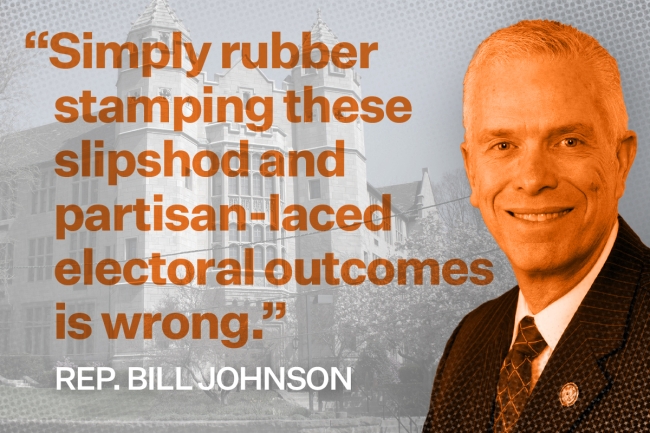You have /5 articles left.
Sign up for a free account or log in.

Youngstown State University community members are raising concerns about the hiring process for new president Bill Johnson and his record as a Republican congressman.
Photo illustration by Justin Morrison/Inside Higher Ed | Wikipedia Commons | U.S. House of Representatives
The surprise hire of Representative Bill Johnson as president of Youngstown State University is raising concerns among faculty, students and alumni, both for the way the hiring process was handled and about Johnson’s record, which includes questioning the outcome of the 2020 presidential election.
Youngstown’s Board of Trustees hired Johnson, a 26-year U.S. Air Force veteran and businessman who was first elected to Congress in 2010, during a special meeting shortly before the Thanksgiving break.
Now, campus constituents are bristling at the decision to hire the local congressman, a Republican hard-liner who backed some of former president Donald Trump’s most controversial decisions, including a 2017 travel ban on entrants from seven majority-Muslim countries.
Hiring Process Concerns
While some individual professors and other community members take issue with Johnson’s public record, the faculty union argues that the deeper concern is about process, not politics.
Mark Vopat, a philosophy professor and president of the YSU faculty union, told Inside Higher Ed that the board bypassed common practices, such as announcing three finalists and welcoming them for campus visits. Instead, the trustees hired Johnson in a move that came as a surprise.
“Faculty were caught off guard,” Vopat said, noting the campus only learned of the vote to hire a president two hours before the board met in emergency session on Nov. 16 to authorize contract negotiations with Johnson to become the next president of YSU. Five days later, the trustees met again to formalize Johnson’s offer.
YSU’s trustees, who are appointed by the governor of Ohio, voted 8 to 1 in both meetings to bring Johnson on board.
“This is completely different than every other search,” said Volpat, who noted that in his 20 years at YSU, finalists had always met with faculty, students and others to discuss their vision for the university. Absent that process, Volpat said, Johnson’s plan for Youngstown State is unclear.
“We literally have zero knowledge of his vision for the university,” Volpat said.
While YSU’s faculty union has emphasized that politics aren’t the sticking point for members, students and alumni have made clear that they find Johnson’s record problematic; they’ve criticized his stances on LGBTQ+ rights, abortion, immigration and other issues.
“Any questions regarding Congressman Johnson’s policy positions, if asked, were answered behind closed doors. The Congressman has opposed gay marriage, supported then-President Trump’s ban of travel from majority-Muslim countries, and, without evidence, questioned the validity of the 2020 presidential election. These issues cast doubt on his ability to lead YSU’s diverse student body. The Board’s choice to unilaterally move forward with no community input is fundamentally undemocratic in a moment that calls for more, not less, stakeholder participation,” a group of alumni wrote in a letter to the Youngstown State trustees.
And Johnson’s hire has prompted campus protests, according to local media reports.
The Youngstown State University Foundation has also objected to the selection process, noting in a post on X that foundation leaders “would have preferred a more inclusive process that represented the University’s students, faculty, and staff, along with its donor base, supporters, and alumni.”
Individual trustees did not respond to requests for comment from Inside Higher Ed. Youngstown State officials pointed to a press release announcing Johnson’s hire, which suggested that the board sought input by surveying faculty, staff, students and alumni on what qualities and skills they wanted in YSU’s next president.
“We asked members of our executive leadership team, all our vice presidents, our provost, our academic senate leadership and our foundation leadership to interview our final three candidates and we took all of their input into consideration as our board entered its final deliberations,” board member Anita Hackstedde said in the university press release.
(YSU's Academic Senate chair did not respond to a request for comment. It is unclear whom the other two presidential finalists were; Ohio law does not require institutions to release their names, and YSU has been unwilling to share them.)
Trustee Michael Peterson, in the same press release, acknowledged that “this decision is not immediately being embraced by everyone.” But he suggested that Johnson would soon “show our YSU family why he’s the leader we need right now.”
Trustees seem undeterred by the backlash. Several appear to support Johnson’s political agenda, judging from the donations they’ve made to his election campaigns over the years. Trustee Joseph Kerola has donated $22,000 to Johnson since 2009, Charles T. George has also contributed nearly $22,000 since 2011 and Richard Fryda has given $19,000 since 2013, according to donor records from the Federal Election Commission.
Johnson will join YSU in March, according to the university news release.
The Bigger Picture
In their attacks on Johnson, critics have specifically pointed to his denial of the 2020 election results and his opposition to same-sex marriage, which some believe may make LGBTQ+ students feel unwelcome and affect recruiting.
Johnson lands on the opposite side of many higher education leaders, who have addressed issues such as the Muslim travel ban and election integrity even amid a general reticence among college presidents to offer statements on divisive political issues.
In 2017, while many college presidents were speaking out against the travel ban from majority-Muslim countries, Johnson voiced full support for Trump’s policy. Where college leaders expressed concerns about xenophobia and discrimination, Johnson advanced Trump talking points.
And in 2018, when the Supreme Court upheld the travel ban, Johnson praised the move and, in an interview with NPR, disputed that Trump had ever called for a complete stoppage of Muslim visitors to the U.S.—despite video evidence of Trump making such a statement.
Johnson also threw his weight behind Trump’s election lies after he lost to Joe Biden in the 2020 presidential campaign. In a statement issued on Jan. 5, 2021—one day before insurrectionists stormed the U.S. Capitol in an effort to prevent the election from being certified—he said he supported “objections to the certification of the Electoral College vote of Pennsylvania, and possibly other states on grounds that they: potentially violated the U.S. Constitution; disregarded their own state election laws; and/or failed to count all legal ballots.” Johnson also argued that “simply rubber stamping these slipshod and partisan-laced electoral outcomes is wrong.”
Johnson and Trump have also traded endorsements; the former president supported the congressman’s re-election bid last year, declaring, “Bill is fighting to Support our Military and Vets, Defend our Second Amendment, Secure the Southern Border, Promote American Energy Independence and Protect the Coal, Oil, and Gas Jobs that come with it. Bill Johnson was an early supporter of our MAGA movement, and he has my Complete and Total Endorsement!” [sic].
Johnson endorsed Trump in the 2016, 2020 and 2024 presidential elections.
Johnson also voted in line with the Trump administration 96.8 percent of his time in Congress, according to data from the website FiveThirtyEight.
Johnson’s ascent to the presidency of Youngstown State follows a pattern in conservative states where GOP lawmakers are increasingly considered for or hired as college presidents. Florida is perhaps the best illustration of that pattern, with former U.S. senator from Nebraska Ben Sasse tapped as University of Florida president late last year. Since then, former Republican state lawmaker Richard Corcoran has been hired to lead New College of Florida and Fred Hawkins was named president of South Florida State College; both are allies of Republican governor Ron DeSantis. Other DeSantis allies have narrowly missed out on presidential posts.
Vopat suggests that Florida-style politics, which puts higher education increasingly in the crosshairs, is creeping into Ohio. He points to Senate Bill 83 as one example; the proposed legislation would limit diversity, equity and inclusion initiatives; weaken tenure protections; and introduce various other changes for state institutions.
As a graduate of Troy University with a master’s degree from Georgia Institute of Technology, Johnson’s path to the presidency is unusual in that most of his career was spent climbing the military rather than academic ranks. He does not appear to have prior experience working in higher education. That makes him an anomaly among his peers, according to the latest American College President Study from the American Council on Education, which found that only 9 percent of leaders surveyed entered the position from outside higher education.
Johnson did not respond to a request for comment from Inside Higher Ed, and it was not immediately clear when he will formally depart Congress to take the job. But he’s already sought to separate his political record from his future as Youngstown State University’s next president.
“I know some have questioned my professional and educational experience,” Johnson said in a university statement after his hire was announced. “As president, my history in politics will not be reflected in the decisions I make for YSU and the students of YSU.”








